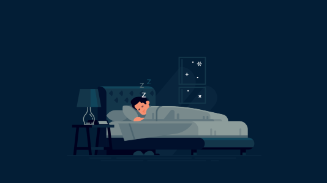Sleep Hygiene
News
- Cervical Cancer Awareness Week 2024
- Alcohol Awareness Week 2023
- Silvercloud
- The Resilience Tree
- Sleep Hygiene
- Gut Health
- The Removal of Sugar Sweetened Beverages in UCD
- Healthy Eating Blog Series
- Sustainable Eating
- Healthy Eating for Commuting
- Stress
- Digital Detoxing
- Stress Management
- Award Winning Physical Acitvity @ UCD
- Heartfulness Meditation
- Fitness Options@UCD
- Wellness Wednesday
- Workplace Wellbeing
- Alcohol Week
- UCD Exercise Programmes Available for Staff
- HEA Higher Education Healthy Campus Charter

Making sure we get enough quality and quantity sleep every night is just as important for a healthy lifestyle as the food we eat and activity we do. But it’s often put at the bottom of the list when we are at our busiest, especially when assignment deadlines build up and exam season approaches. We ask a lot of our body and mind every day, so it’s essential that we give it time to rest and repair at night. However, it can feel like we live in a world that’s on the go 24/7, especially with smartphones and social media always within an arm’s reach, making it tricky to switch off and snooze. With that in mind, let’s look at some simple tips to help you take back your bedtime!
- Create a Relaxation Routine
I’m sure most of you reading this had a ‘bedtime routine’ as a child. Well, as adults, it turns out we need one too! Having a night-time routine that relaxes your mind and body is the best and first step to help you drift off. In the hour before bed, make it your mission to power down. This means reducing or eliminating screen time – television, tablet, phone, you name it. That can seem challenging to do, as we use smart devices for many things from social media, to emails, to texts and calls. A large amount of smart screen activity before bed will only keep your mind stimulated, and in addition to this, smart devices emit light with a high concentration of ‘blue light’, which has been found to suppress our sleep-inducing hormone, melatonin, causing a delay in the onset of our sleep. Instead of scrolling through your social media feed, why not try reading a book, chatting with your family or partner, listening to calming music, or engaging in a short meditation? See if you notice a difference for the better!
- Create a Caffeine Cut-off
Caffeine, which we mostly ingest through consumption of coffee and tea (and perhaps energy drinks, particular at exam time!) is a stimulant. It has a half-life (i.e. the time it takes to eliminate half the caffeine you ingest) of approximately 5-6 hours. So if we don’t time our intake right, we may end up with a lot of it in our system quite late in the day when we are trying to switch off. Additionally, due to our genetics, each of us varies in the speed with which we metabolise caffeine. The average 200ml cup of coffee contains about 90-100mg of caffeine. An upper limit of 400mg per day is what has been deemed safe for most healthy adults. If you’re struggling with sleep, take a closer look at your caffeine intake over the day. And remember, decaf does have a little bit of caffeine in there too! A handy rule of thumb is to try not to consume caffeinated beverages after midday, to ensure as much of it is out of your system as possible by the time you hit the hay.
- Get Active During the Day, Every Day!
Improved sleep is high up on the lengthy list of health benefits physical activity provides, both in terms of sleep quality and quantity. Studies have shown these improvements in those with actual clinically diagnosed insomnia, as well as the general population. However, it is important to try to avoid exercising at high intensities in the 2-3 hours before bedtime, as exercise is a form of stress to the body and activates our sympathetic nervous system responsible for that ‘fight or flight’ response we all know so well! It is generally best to try to be active throughout the day for the best benefits for sleep. It’s also recommended to try to get some of that exercise in outdoors – for example, by going for a run or a walk before work, or at lunch or in the early evening as exposure to natural light during your day, particularly earlier in your day, helps regulate our internal body clock (known as our circadian rhythm) each day.